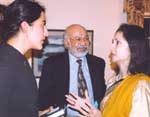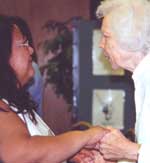 All material ©2006 Initiatives
of Change
All material ©2006 Initiatives
of Change
After this first meeting, you may decide to meet again. If at some point you and your new friends want to begin to take some action in your community, you may think about forming an organized team. To learn more about building teams to address racial and cultural divisions, contact Rob or Susan Corcoran with Hope in the Cities and ask them for the Connecting Communities Toolkit.
Here are some principles to keep in mind when seeking to heal divisions and build community:
- Listen carefully and respectfully to each other and to the whole community.
- Bring people together, not in confrontation but in trust, to tackle the most urgent needs of the community.
- Search for solutions, focusing on what is right rather than who is right.
- Build lasting relationships outside our comfort zone.
- Honor each person, appealing to the best qualities in everyone, and refusing to stereotype the other group.
- Hold ourselves, communities and institutions accountable in areas where change is needed.
- Recognize that the energy for fundamental change requires a moral and spiritual transformation in the human spirit.
from A
Call to Community
(top)
A lot of the information on this site is available in a PDF booklet which you can print for your own use or to share with others.
Guidelines for Great Discussions
Great discussions don’t just happen. They take work—especially when people are from different backgrounds and cultures! For some more resources check out the links on the Open Homes website.
1. Talking: You’re having an honest conversation when you …
- say things you need to say instead of saying things you want to say
- say things to reveal your feelings instead of saying things to accuse others
- say things to disclose your own reality instead of saying things to control another person’s reality
- say things that you really believe instead of saying what’s expected or stereotypical
- say things in such a way that indicates
an openness to growth and the future instead of speaking only to the
past.
by Paige Chargois
from the Connecting
Communities Handbook
2. Listening: An honest conversation also means listening. It may seem obvious, but listening is a vital tool. Especially when you’re with people who are different from you or with whom you disagree! Try to show you are hearing what’s being said by your words and actions. Be aware of your own culture’s values and ways of doing things, so you can avoid making unfair judgments or reactions about others. It’s easy to think our way is always best, but it’s more productive to try to see things from the other’s perspective.
3. Responding: Again, this isn’t a time to argue perspectives or decide what to do next. Just listen and encourage your guests to speak from their hearts. Sometimes it is helpful to stop and reflect back to the speaker what you hear him saying, so he knows you understand. Don’t be afraid of silence! It can be an important part of conversation.
4. Time Sharing: Be sure that everyone gets a chance to speak and that no one dominates the time. It may be helpful to state at the beginning how much time is available for each person to talk and to establish a respectful way of reminding people if they go over that time.
REMEMBER: Different cultures have different ways of communicating! Unconscious gestures or phrases can have humorous (or embarrassing) results. The links page willl direct you to some websites about communicating across cultures that can help you “say what you mean.”
|



